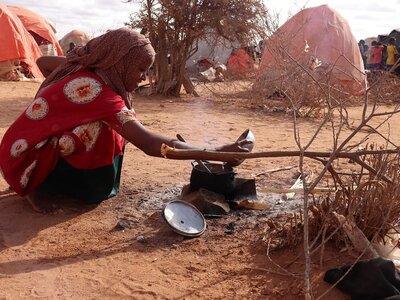Somalia
- 4.4 million
- people projected to face crisis levels of food insecurity.
- 1.7 million
- children facing acute malnutrition
- 18.7 million
- population
The longest drought on record drove Somalia to the brink of famine in 2022, averted at the eleventh hour by an unprecedented humanitarian scale-up led by the World Food Programme (WFP) and partners.
But the hunger crisis is far from over, with recurrent droughts and floods, conflict and high food prices threatening to displace families, disrupt farming, restrict market access and increase humanitarian needs.
A total of 4.4 million people (23 percent of the population) are projected to face crisis levels of hunger between April and June 2025, when below-average Gu rains are forecast. A total of 1.6 million children face acute malnutrition through the year.
WFP addresses basic needs in Somalia in times of crisis. We also work with the Government and other partners on projects to build longer-term food security and resilience against future disasters.
However, critical funding gaps mean WFP is forced to prioritize and reduce assistance at a time when hunger is once again on the rise.
What the World Food Programme is doing in Somalia
-
Emergency food and nutrition assistance
-
As the largest humanitarian agency in Somalia, WFP rapidly responds during disasters to help families meet their basic needs. We deliver life-saving food assistance through in-kind rations or through cash, which gives recipients more choice and creates new markets for local producers and retailers. We also deliver specially fortified nutritious foods to help treat and prevent malnutrition in children, pregnant and breastfeeding women.
-
Social protection and safety nets
-
WFP is committed to ensuring that vulnerable people can access basic social services and social protection, to build human capital (health, skills, knowledge and experience) and resilience. This can in turn ensure that they are less vulnerable to recurrent climate crises and other shocks. WFP supports the Government-owned national safety net, Baxnaano, as well as the provision of locally sourced school meals that can help keep children in school.
-
Food systems and anticipatory action
-
To increase resilience against recurrent climate crises and achieve zero hunger, food systems must be inclusive, climate-adaptive and productive. WFP works with food producers, retailers, national institutions and the private sector on programmes including livelihoods training, community assets creation and rehabilitation, and smallholder farmer support. WFP also supports anticipatory action, through pre-emptive cash transfers and community awareness campaigns on coping strategies, to lessen the impact of forecasted climate shocks.
-
Institutional capacity strengthening
-
WFP has strong partnerships with both Federal and Federal Member State-level ministries and institutions in Somalia, and provides policy advice, capacity development and knowledge sharing, to enhance Government systems and programmes that address hunger. WFP support includes technical assistance, infrastructure projects and the direct deployment of human resources.
-
Humanitarian air and logistics support
-
WFP provides services that enable humanitarian and development actors, including different levels of Government, to respond to emergencies and reach people most in need. The WFP-managed United Nations Humanitarian Air Service transports personnel and cargo across Somalia, while our extensive port and warehouse footprint helps facilitate the storage and movement of supplies into and around the country and the wider Horn of Africa.
Somalia news releases
Go to pageFind out more about the state of food security in Somalia
Visit the food security analysis pageOperations in Somalia
Contacts
Office
UN Crescent, Gigiri. PO Box 64902 - 00620
Somalia







